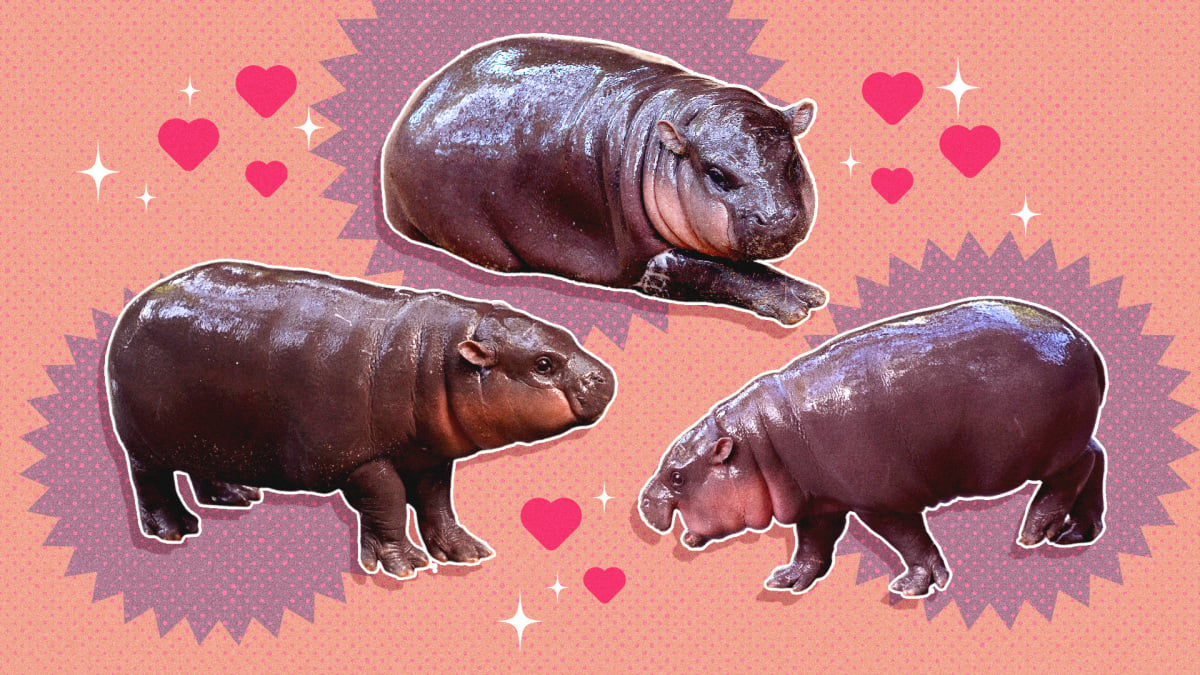The internet loves cute animals. (Shocking, I know.) But more than a fact of life, it’s practically a pillar supporting the weight of the online world’s entire infrastructure.
Some of the earliest internet moments — Keyboard Cat, for instance — centered on critters. And that hasn’t changed, even as the internet grew infinitely more complex and vast. The online world today is hardly what it was in 2020, let alone what it was in its infancy. Yet, all this time, cute animals have been a staple of killing time online.
Enter Moo Deng, the wildly cute baby hippo that has gone viral over the past week. She is a shiny, rotund, two-month-old female pygmy hippopotamus at Thailand’s Khao Kheow Open Zoo. Everywhere you look, people post about her. Interestingly, it’s not only the kind of cringe, doggo-core adoration you’d expect from millennials with a mortgage. You might catch some of the more jaded, chronically online posters in your life posting about Moo Deng.
So…why? Why is everyone posting about Moo Deng? First and foremost — and let this be imminently clear — because she is really freaking cute. That little rolly-polly face is wonderfully squishable. She is often seen screeching and bouncing around like a tusked Roomba. Moo Deng is, effectively, an exotic, somewhat slimy English bulldog. What is there not to love about that?
The Washington Post noted that studies have shown that particularly cute animals have the sort of “baby schema” — physical baby-like features — that trigger our evolutionary urge to provide care. Moo Deng’s big eyes and skin rolls make us go into parent mode — even if she’s a pygmy hippo.
“When we see these infantile features — those big eyes, large foreheads, small chins, and pudgy bodies — we interpret that as helplessness and as dependency, and it motivates us to care for them,” Daniel Kruger, a research scientist in evolutionary psychology at the University of Michigan and the State University of New York at Buffalo, told the Post.
But there’s more than just that going on. We’re not even seeing these animals in person, yet we constantly grant these creatures celebrity status. Think: Grumpy Cat, Doug the Pug, Marnie the Dog. Hell, there’s even the previously mega-viral hippo Fiona at the Cincinnati Zoo. What drives us to make these animals so popular?
We see open-mouthed, blurry snaps of Moo Deng, and we get to make her a mischievous, cherubic little character.
For one, animals are not going to let you down like, well, most other internet celebrities. In the cycle of virality for people, there’s typically the moment where they get Milkshake Ducked, which is a meme that’s become shorthand for discovering the often offensive or unpleasant past of a newly viral celeb. It stems from a Twitter joke from @pixelatedboat where a viral duck that drinks milkshakes has its racist past uncovered. The joke works because a viral animal is the only viral star to which this cannot happen.
It’s OK to stan a silly little hippo because a silly little hippo is never going to make a hard rightwing turn or have its unsavory Reddit account uncovered. In some ways, a cute little creature is a blank slate. We get to anthropomorphize a personality unto them as a collective. We see open-mouthed, blurry snaps of Moo Deng, and we get to make her a mischievous, cherubic little character. In the absence of, you know, animals being able to express themselves, we do it for them. It’s sort of what we do with our own pets. Together, we make an adorable creation.
That’s part of the appeal as well. Everyone loves animals—Republicans, Democrats, Robert Kennedy voters (well, maybe not that last one). In a time when even the most popular recording artist alive sparks division, it’s nice to have something we can all agree on online.
That’s quite a lot to rest on Moo Deng’s little shoulders. Though she doesn’t seem to mind.
https://mashable.com/article/moo-deng-hippo-viral-cute-animals-explainer


